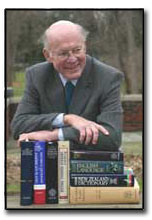September 2005
Talking about Words: You Could Look It Up
With Prof. Richard W. Bailey
"Ain't ain't a word ‘cause it ain't in the dictionary." My students tell me that year after year and it's one of the few things they remember having been taught about the English language. They think bad words don't get in the dictionary. But they do. And they should.
Ain't is certainly a word, and it has a long if not always respectable history. We have documentation for it back to 1778.
According to the big collection of speech used at U-M over many decades, people here haven't used ain't much—at least when their speech is being recorded. It's a vulgar error, they think.
Being prissy about ain't on the in-field of a NASCAR race, however, is pretty much like objecting to the beer-drinking or body art encountered there. If you're smart, you'll shut up about your prejudices until you're somewhere safe; your ivory tower, for instance.
Who would prefer that the heart-broken young fan at the time of the 1919 Black Sox scandal had said to Shoeless Joe Jackson: "Say it isn't so, Joe"? Who would imagine that Fats Domino's 1955 hit would have better been called: "Isn't that a shame"? Would it have been an improvement if Louis Armstrong, Ella Fitzgerald, and Fats Waller had corrected Andy Razaf's lyrics to "Am not either misbehavin"? (Sounds petulant and defensive, doesn't it?)
More troubling than "ain't ain't a word" is the part that claims it "ain't in the dictionary. " It's been there a long time, girded about with warnings to the innocent and affirming the prejudices of the ideologues.
Ain't is a sure enough a word, and it's in every dictionary. Good ones tell you that it's more common (and more widely accepted) when it functions as be rather than have. "He ain't too smart" is "better" than "She ain't got her book. "
"You could look it up. " If students did that in high school, they'd know that the all-wise teachers had been foisting a bogus adage on them. "Looking it up" is supposed to provide the definitive answer.
Back in 1941, James Thurber published a story: "You could look it up." In it, an old baseball manager recalls when a national league team put in a little person to pinch-hit, figuring that the pitcher couldn't find the tiny strike zone. But the little person was delighted to be a player, and so he hit a tiny squib into the infield and was thrown out at first amid great hilarity. The manager says, to affirm his story, "You could look it up."
A decade later, Bill Veeck of the St. Louis Browns put in Eddie Graedel, 3'7", against Detroit Tiger pitching and warned him not to think of swinging the bat. After Graedel walked, the president of the American League had has name struck from the record book, so nobody could look him up. That was wrong.
It was the same tampering with reference books that afflicted the Great Soviet Encyclopedia from which inconvenient old Bolsheviki would vanish from successive editions and new entries would be concocted to show that Russian scientists had invented everything.
We want the books in which we look it up to tell us the truth, unvarnished, however inconvenient it might be.
Being in (or out) of the book counts for something. And lots of people want to know how words get into the dictionary.
The answer is quite simple. The lexicographer has to imagine that someone will look in the dictionary for the word. So a scientific word appearing in a poem has a better shot at getting in than a scientific word that doesn't. Or an obscurely-named affliction that strikes a famous person.
Frequency, extent, and durability have something to do with the decision. So does a word's appearance in a competing dictionary. If Merriam or New World has it, American Heritage has to have it too. If Merriam doesn't have it, then American Heritage can put it in and claim to have more words than its closest competitor.
There are words people want out of the dictionary—racial and ethnic slurs, for instance.
In June 2005, the British Potato Council launched a campaign to have couch potato removed from the Oxford English Dictionary where it has lain dormant since 1993. Using couch potato for a person watching television in a more-or-less vegetative state is not good for the spud, the Council thinks.
(The Council drew strength from the powerful belief that most expressions Britons don't like were invented in America. The first known use of couch potato appeared in print in 1979 in Los Angeles. )
The campaign didn't go after the low- carb diet doctors but instead went noisily to Parliament in London and to the offices of the Oxford English Dictionary in Oxford. It was a stunt to celebrate the "Great British Potato" and the 4000 growers who make up the Council.
Well done, Council. Lots of publicity. And John Simpson, editor of the dictionary, got to make a joke about how recent nutritionists have given the Great British Potato "a bit of a mashing."
In a more serious vein, John Simpson said this: "When people blame words, they are actually blaming the society that uses them. Dictionaries just reflect what society uses."
If ain't is still around, it has to be in the book. Even if ball players come in unconventional sizes, they deserve to be there too. If glassy-eyed couch potatoes are among us, they have earned their lexical way in.
You could look it up.

Richard W. Bailey is the Fred Newton Scott Collegiate Professor of English. His most recent book is Rogue Scholar: The Sinister Life and Celebrated Death of Edward H. Rulloff, University of Michigan Press, 2003—a biography of an American thief, impostor, murderer and would-be philologist who lived from 1821 to 1871. It was published by the University of Michigan Press in 2003.
|


